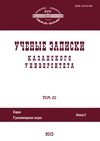ОСОБЕННОСТИ АДАПТАЦИИ КИТАИЗМОВ, ОБОЗНАЧАЮЩИХ КУЛЬТУРНО-БЫТОВЫЕ РЕАЛИИ, В РУССКОМ ЯЗЫКЕ
ADAPTATION OF WORDS RELATED TO THE CHINESE DAILY LIFE AND CULTURE TO THE RUSSIAN LANGUAGE
Author(s): Siqi LiSubject(s): Theoretical Linguistics, Lexis, Semantics, Comparative Linguistics, Eastern Slavic Languages, Sociology of Culture, Philology
Published by: Казанский (Приволжский) федеральный университет
Keywords: realia of culture and daily life; Russian language; Chinese language; loanwords; adaptation of loanwords; lexical semantics; word-building potential;
Summary/Abstract: The paper is concerned with the study of adaptation of words from the Chinese language to the Russian language; these loanwords are related to the daily life and culture of China. The relevance of the study is determined by the increasing popularity of the Chinese culture and daily phenomena within the Russian society. Therefore, the formation of a scientific image of relevant loanwords and the analysis of their derivational potential in the Russian language seem very necessary and important. This paper aims to identify the derivational, formal-structural, and semantic features of the studied units in the process of their development in the Russian language. The transcription method is mainly used when borrowing words from the Chinese language; thus, the loanwords receive a Russian form and pronunciation along with grammatical characteristics. Based on the results of the semantic assimilation, the following conclusions were made: when loanwords came to the Russian language, the semantics of their prime words can be changed; the semantic volume of some words can be expanded with their further functions in the Russian language, which indicates their full semantic development. According to the results of the derivational-semantic analysis, 149 derivatives were formed on the basis of the studied units in the Russian language. It was revealed that kniga (‘book’; 50 derivatives), chai (‘tea’; 45 derivatives), zhemchug (‘pearl’; 11 derivatives) possess the highest derivative ability. The study of word-formation adaptation allows us to conclude that the realization of the derivational potential of loanwords indicates their importance for the native speakers of the Russian language.
Journal: Ученые записки Казанского университета. Серия Гуманитарные науки
- Issue Year: 161/2019
- Issue No: 5-6
- Page Range: 89-104
- Page Count: 16
- Language: Russian

